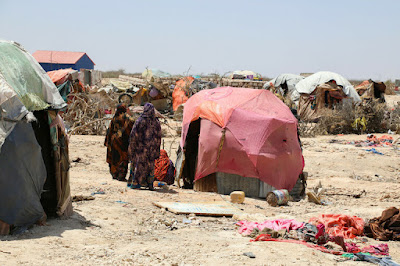[PRESS RELEASE]: Women and Girls Left Vulnerable in Worsening Somalia Drought Crisis
 |
| Women in IDP camps in Somalia. CARE |
With the drought intensifying in Somalia, the protection of women and girls is at a higher risk now than ever. Protection is one of the least funded clusters at only 11.4%. With $127.7Million required, only $14.5 Million has been allocated.
A recent CARE report showed that as gender inequality goes up, food security goes down. Women are eating the last and least portions. In some parts where men would report eating fewer meals, women were not eating any meals at all.
The worsening drought in Somalia has resulted in women having to walk farther to access water and basic services leaving them vulnerable to sexual violence. More girls are dropping out of school putting them at risk of early marriages. Parents who can no longer afford to pay for schools are resorting to prioritizing the boy child over the girl.
The Key protection concern is Female Genital Mutilation (FGM). During the COVID-19 pandemic, it was noted that there was an increase in FGM as girls were away from school. FGM opens the avenue of early marriages. As the drought exacerbates, many girls are dropping out of school to support their parents in the food search. 12-year-old Susan had to drop out to help her parents. “I used to cook for the family, sometimes I would take care of the animals and collect firewood. While we were there, life became even harder as we lost all our livestock.”
Millions of people have been displaced resulting in high levels of family separation that is, inadvertently, exposing women and girls to Gender-Based Violence (GBV). As families struggle to cope with the current drought situation, women are taking on more responsibilities as female-headed households increase. Women are responsible for 90% of preparing and buying food. With the onset of the drought, Women’s businesses have been adversely affected forcing many to lose their sources of income.
 |
| Habiba (in green) receives a CARE package from a CARE staff member at an IDP camp. CARE |
Habiba is among the thousands of Somali women who have faced emotional and psychological abuse. As a divorced mother and sole breadwinner of 9 children, Habiba encountered stigmatization at the IDP camp she fled to due to her marital status and as a result was ostracized. “The clan fights and destruction of my life left me very scared. I lost all my belongings, and even though I settled at this camp finding food and providing for my family remained very difficult. I was forced to go out and beg for food.”
Iman Abdullahi, CARE International Country Director Said, “The erosion of women’s and girl’s rights is detrimental to the progress made over the years. Reports from those displaced by drought indicate a 200% rise in GBV cases, particularly intimate partner violence and rape, compared to the same period in 2021. Early marriage of girls rose by 3% during Oct 2021- March 2022 period. Linked with that are the risks of harmful traditional practices such as Female Genital Mutilation. This calls for an increase in support for the protection sector, especially on this International Day for Rural Women.”
Currently, CARE is working in IDP camps to offer not
only psychosocial support to affected women and girls but also health and
education support.
//END//
For media inquiries, please contact Walter Mawere, Care Somalia Advocacy
& Communications Coordinator via: Walter.Mawere@care.org



Comments
Post a Comment